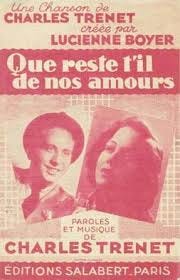Nobody does regret better than the French. For misery, look no further than Germany. The English excel at apology, while Americans…well, a nation that aspires to exist in the eternal present has no time for the past.
To me, the French capacity for regret is most apparent in their songs – or at least the songs known as chansons: those superficially trivial expressions of love and loss that made up the repertoire of Edith Piaf, Charles Aznavour, George Brassens and Charles Trenet.
Trenet wrote the famous La Mer, a celebration of the sea which the English version comprehensively trashes. No lover “stands on golden sands” in the original, “watching the ships that go sailing.” There are no lovers or ships or sands or even people. Just…the sea.
Another Trenet chanson traduced in translation is Que reste t’il de nos amours? The title means, literally, What Remains of Our Loves? But outside France it’s better known as – and I cringe to think of it – I Wish You Love. Most people hear it in the Sinatra version. You know…. “And in July a lemonade/To cool you in some leafy glade/I wish you health and more than wealth/I wish you love.”
You will not be surprised to hear that M. Trenet didn’t celebrate lemonade and leafy glades. Neither were available in the Nazi-occupied Paris of 1942, when he wrote it. In Montparnasse, the great cafés had boarded up their windows and doused their lights. In Montmartre, a few smaller clubs survived. One of these, Chez Elle (Her Place), occupied the basement of the Hôtel Alsina on Avenue Junot. “Elle” was smoky-voiced torch singer Lucienne Boyer, who was the first to record the song.
Trenet was gay, and at daily risk of deportation. Boyer was married to Jewish crooner Jacques Pills. Jean Neuburger, who composed many of her successes, including her theme song Parlez-Moi d’Amour, was also Jewish, and his music therefore banned from public performance. By posting a “Jews Not Admitted” notice at the door of the club, Boyer hoped to be overlooked by the Germans but all of them lived daily with risk.
Should we be surprised that people surviving under such conditions didn’t write of lemonade or health or wealth or leafy glades? The wonder is that they wrote anything. Here – with English subtitles - is Trenet in a 1943 film, listening to his own recording of a song filled with….well, regret.





Yes, that one has always jarred with me. I love the optimism of "Good morning, America. How are you? Don't you know me? I'm your native son...." If only Amtrak lived up to that early promise.
The vintage chanteurs are my favorite. Because I’m a retro hipster? No. Because they articulate so clearly and I can understand what they are saying. As do Bruel and Cabrel. (And surprisingly Stromae.) But Thérapie TAXI . . . Now back to my regularly scheduled yelling at those damn kids to get off my lawn.